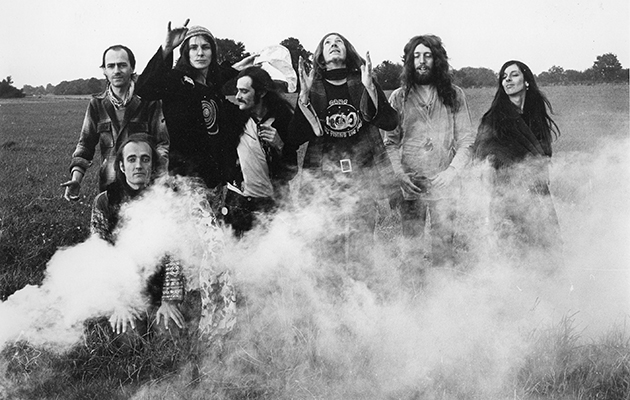The story of Gong starts in 1967, where Daevid Allen, then de facto leader of the up-and-coming psych-pop outfit The Soft Machine, is playing London’s Speakeasy Club surrounded by rock royalty.
“Hendrix was chatting up some girls at the next table. Keith Moon was getting drunk. There were sundry members of The Beatles and the Stones and Pink Floyd dotted around the place.” Allen’s voice becomes ever more withering with every casual namedrop.” And it was like the court of King Louis XVI or Henry VIII, it was just seeping with decay. Everyone had this weird sense of entitlement, which, as an old communist, disgusted me. I realised at the time, fuck, I don’t feel good in this situation, I’ve got to get out of here.”
The chance to leave came in April 1967, when he was returning to England after a brief visit to Paris. Customs officials at Dover examined his Australian passport and informed Allen that his visa to remain in the UK had expired.
“It didn’t help that I was dressed in loon pants and had hair down past my shoulders,” he chuckles. “Anyway, they chucked me out, and that effectively killed off my involvement with Soft Machine. But it meant I could make a new start in France.”

It helped that Allen already had roots in the country. Born in Melbourne in 1938 as David Allen (“the ‘e’ in Daevid stands for ego,” he says, “to differentiate me from all the comedians and actors and sportsmen of the same name”) he was part of a generation of postwar Aussie creatives who fled to Europe in search of culture. He arrived in Paris in 1960, being drawn to the Beat Hotel, a run-down joint favoured by the likes of Allen Ginsberg and Brion Gysin. He got to know US expats William Burroughs and Terry Riley, sold hash, and flirted with tape loops and the Fluxus movement. He also got to know an English professor at the Sorbonne, the poet Gilli Smyth.
Finding himself back in Paris in 1967 after being thrown out of England, Allen hooked up with Smyth. The two married and formed the axis of the first incarnation of Gong in late 1967, together with vocalist Ziska Baum and flautist Loren Standlee. Allen, experimenting with an electric guitar and a box of 19th-century gynaecological surgical instruments, developed a form of guitar playing heavily influenced by Syd Barrett’s that he dubbed “glissando guitar”. Gilli and Ziska developed a form of breathy singing (“it comes from trying to calm down animals by whispering,” says Gilli) that they called “space whisper”.
“We had a residency at the Vielle Grille,” says Gilli Smyth, “a little club in the Latin Quarter, just in the run up to the May 1968 revolution. It was an incredibly exciting time. The British press tend to dismiss May 1968 as a few student riots, but it wasn’t. It was a civil war, with more workers and trade unionists on the barricades than students. We used to play music for the students.”
One university gig was broken up by police trashing their generator. “Daevid made a speech attacking the police, as the audience cheered. And for that we were going to be deported. So we fled in the night to Spain.”
Allen and Smyth sought sanctuary in Deià, an artistic commune in Majorca. Allen had first visited the island several years earlier with Robert Wyatt, who had introduced him to the poet Robert Graves, an old friend of the Wyatt family. “Graves was part of an intense artistic community,” says Smyth. “He had an amphitheatre in the grounds of his house where he would perform poetry. There were musicians and writers and artists who lived there, and lots of interesting visitors, too, like Spike Milligan, Kenneth Tynan and the Sufi scholar Idries Shah. It was very inspiring.”
It was there that they met Didier Malherbe, who was living in a goatherder’s cave on the island. Malherbe was a jazz saxophonist who had also learned the bamboo flute in India, and spent time in Tunisia learning North African instruments. “I was very influenced by Daevid’s music in Soft Machine, long before I met him,” says Malherbe. “I liked the spirit of fantasy and silliness that he brought. Soft Machine lost it when he left, but that spirit resumed with Gong, mixed with French obsessions like jazz, surrealist poetry and anarchism.”
Allen, Smyth and Malherbe returned to France in 1969 to form the next incarnation of Gong, and needed a place to stay. “I looked in the telephone book,” says Gilli, “put my finger on a name at random and rang it up. And it was a Monsieur Reynard. I said, ‘Do you have a house for rent?’ He said, ‘Well yes, we do, but it’s in the middle of a forest and it hasn’t been lived in for 30 years.’ In fact, it was perfect. We didn’t much like the boars’ heads mounted on the walls – we were all vegetarian! – but it was a wonderful, creative space in the middle of nowhere where we could rehearse all day long without fear of disturbing any neighbours.”



